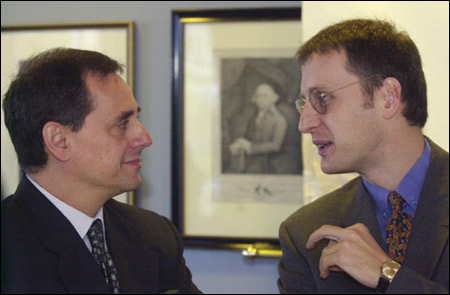Ambassadors discuss Southeast Europe’s future
Nearly a dozen consul generals, ambassadors gather

A stronger, larger Europe will become a better partner, not a bigger rival, to the United States in international affairs, according to European ambassadors and consuls gathered at the Kennedy School of Government last week (Oct. 15).
The group examined key questions facing southeastern and east-central European nations as both the European Union and the North Atlantic Treaty Organization expand to include nations of the former Soviet bloc.
The gathering, sponsored by the Kennedy School’s Kokkalis Program on Southeastern and East-Central Europe, featured nearly a dozen ambassadors and consul generals, making it one of the largest such gatherings in Kennedy School history, according to Kokkalis Program Director Elaine Papoulias.
“It’s definitely a rare opportunity to be able, at one time, to hear the positions of so many countries and to hear important issues facing them in growth and development,” Papoulias said.
The daylong conference, held in the Malkin Penthouse, featured two panel discussions followed by question-and-answer sessions that focused on trans-Atlantic relations and on economic development.
The conference was opened by Kennedy School Senior Associate Dean and Director of Degree Programs Joseph McCarthy. McCarthy said the event well fit the Kennedy School’s mission to foster international understanding that leads to solutions for regional and international problems.
“This diplomatic summit meeting is quite a remarkable event,” McCarthy said. “[It allows us to] pursue a better understanding of the challenges facing this strategically important region.”
The day’s panels featured ambassadors to the United States from Romania, Slovenia, Turkey, Bosnia-Herzegovina, Croatia, Macedonia, Moldova, Serbia, and Montenegro. They also featured the ambassador of Cyprus to the United Nations, the consul general of Hungary in New York, and the consul general of Greece in Boston.
The morning panel, “Transatlantic Relations in an Era of Global Realities,” featured a discussion of two large, ongoing structural changes in the region, namely expansion of the European Union (EU), and expansion of the North Atlantic Treaty Organization (NATO).
The panel’s chair, Viktor Mayer-Schoenberger, associate professor of public policy at the Kennedy School, said that as a native of Austria, he remembers the euphoria that followed the dismantling of the Berlin Wall and the confidence people had that they’d reform their economies and join the West.
“We knew the journey was a long one,” Mayer-Schoenberger said. “What I didn’t expect was that the reconstruction would take so long. Yet when you look at what countries achieved in the last 15 years, it is very remarkable.”
Ironically, he said, nations that have just re-discovered their national identity are being asked to trade part of that for a new European or trans-Atlantic identity.
Speakers said the parallel expansions are both important, but insisted that a larger, stronger Europe would not make the region more of a rival to the United States. Rather, they said, through NATO and existing bilateral ties, a stronger Europe would strengthen the trans-Atlantic partnership between the United States and European nations.
Together, the nations of North America and Europe could be a stronger force globally for democracy and peace, they said.
“The new nations will bring into this a dual and double commitment,” said Gabor Horvath, Hungary’s consul general in New York. “More Europe will not mean less America. More Europe, at least for Hungary, can mean more America.”
A key factor, the speakers said, is that the nations being considered for entry into the European Union already have strong bilateral ties with the United States. The entry of these nations into the European Union could serve to moderate nations that may seek to challenge the United States’ global power.
“These countries bring really, a strong interest in not choosing between Europe and America,” said Sorin Ducaru, ambassador of Romania to the United States. “Our countries have a very recent experience with what the face of evil means and know not to take democracy and freedom for granted.”
Ducaru said that Romania and other former Soviet nations know how hard won freedom can be and how hard it is to build democracy. That humility, he said, can be useful in places like Afghanistan and Iraq, where the local people are taking a similar road.




